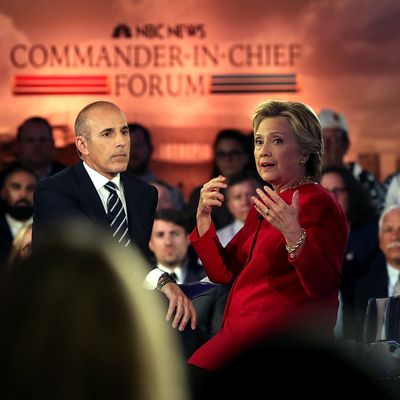
I had not taken seriously the possibility that Donald Trump could win the presidency until I saw Matt Lauer host an hour-long interview with the two major-party candidates. Lauer’s performance was not merely a failure, it was horrifying and shocking. The shock, for me, was the realization that most Americans inhabit a very different news environment than professional journalists. I not only consume a lot of news, since it’s my job, I also tend to focus on elite print-news sources. Most voters, and all the more so undecided voters, subsist on a news diet supplied by the likes of Matt Lauer. And the reality transmitted to them from Lauer matches the reality of the polls, which is a world in which Clinton and Trump are equivalently flawed.
Lauer focused a third of his questioning time on Clinton’s private email server. Her decision to follow Colin Powell’s advice is a legitimate blot on her record. But Lauer did not move the ball forward on the question in any meaningful way:
The word judgment has been used a lot around you, Secretary Clinton, over the last year and a half. And in particular concerning your use of your personal email and server to communicate while you were secretary of state. You have said it’s a mistake.
You said you made not the best choice.
You were communicating on highly sensitive topics. Why wasn’t it more than a mistake? Why wasn’t it disqualifying, if you want to be commander-in-chief?
Lauer followed up with four more email-related questions. The impression an uninformed or even moderately informed viewer would receive from this interview is that the email issue represents a sinister crime, perhaps completely disqualifying from office, rather than an unjustifiable but routine act of government non-transparency.
The email exchange would not by itself be so alarming except when viewed in juxtaposition with Lauer’s hapless interview of Trump. Trump began the interview by boldly insisting, “I was totally against the war in Iraq. You can look at Esquire magazine from 2004. You can look at before that.” This is a lie. Trump has been quoted supporting the invasion beforehand and even afterward. Nobody has produced any evidence of Trump contradicting his support for the war before it started. His line to Lauer was transparently ridiculous – how could a 2004 interview supply evidence of having opposed a war that began in 2003? But Lauer did not try even a single follow-up.
Trump went on to make a series of wild and dangerous statements. He praised Russian President Vladimir Putin as a strong, effective, and popular leader. Lauer did press him on this point, and when he did, Trump offered the astonishing rebuttal, saying President Obama had done equivalently brutish things. Lauer did not press Trump on his claim that the president of the United States behaves in a fundamentally similar way to a dictator who imprisons and kills political critics and journalists. Trump likewise reiterated his belief that “to the victor go the spoils” is the proper basis for American foreign policy, specifically with regard to his long-standing lament that the United States failed to steal Iraq’s oil after the 2003 invasion.
Lauer’s attempt to press Trump was the completely ineffectual technique of asking repeatedly if he is ready to serve as commander-in-chief. Lauer probably believes the answer is no, but nothing about this question would drive home Trump’s extraordinary lack of knowledge. Instead it allowed him to performatively demonstrate his confident, alpha-male reality-show character as a prospective chief executive.
Both of these beliefs stun and appall foreign-policy experts in both parties, as readers of the Washington Post or the New York Times know. But the average undecided voter isn’t reading those newspapers. The average undecided voter is getting snippets of news from television personalities like Lauer, who are failing to convey the fact that the election pits a normal politician with normal political failings against an ignorant, bigoted, pathologically dishonest authoritarian.
Update: National Review’s Charles C.W. Cooke writes, “Welcome to the Club.” Cooke’s point is that my dismay at Lauer’s performance contradicts another piece I wrote four years ago, about the liberal influence of Hollywood. “Now he believes that pop culture — which is just as shallow and dumb as it’s always been; Lauer is no anomaly — is hurting him and his party. And we can’t have that!,” sneers Cooke.
Cooke’s accusation of hypocrisy suffers from two flaws, each of them fatal. First, my 2012 essay, which Cooke does not link, does not celebrate liberal influence, it describes it, and indeed argues the conservative critics have reason to feel resentful:
This capacity to mold the moral premises of large segments of the public, and especially the youngest and most impressionable elements, may or may not be unfair. What it is undoubtedly is a source of cultural (and hence political) power. Liberals like to believe that our strength derives solely from the natural concordance of the people, that we represent what most Americans believe, or would believe if not for the distorting rightward pull of Fox News and the Koch brothers and the rest. Conservatives surely do benefit from these outposts of power, and most would rather indulge their own populist fantasies than admit it. But they do have a point about one thing: We liberals owe not a small measure of our success to the propaganda campaign of a tiny, disproportionately influential cultural elite.
Cooke’s notion that I have been hoisted by my own petard implies that Hollywood is my petard, rather than an institution I analyzed critically as a source of liberal propaganda.
Second, the entire focus of that essay was on Hollywood – movies primarily, but also television shows like Modern Family, Glee, and so on. My criticism of Lauer focused on television news. Those are different things entirely. Did I think morning television or soft-focus feature news has a pronounced liberal bias? No, I don’t think that, I didn’t think that and I didn’t write that.






























